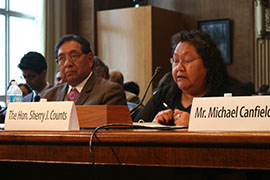By Samantha Vicent, Tulsa World
The Bureau of Indian Affairs on Monday released their final rules that revise government regulations relating to development of the Osage Nation’s minerals estate.
BIA Director Michael Black told the Tulsa World on Friday that the release comes nearly three years after a $380 million Osage tribal trust settlement resolved litigation alleging the U.S. mismanaged the tribe’s minerals.
The new rule, which was made available for public inspection in the Federal Register that day, clears issues that Black said the Bureau and Nation couldn’t remedy through the 2011 settlement, in which a federal judge said the U.S. “grossly mismanaged” the nation’s oil and gas money.
The document says the regulations will take effect July 10, and include developing and implementing standardized reporting to manage production and accounting; improving methods for calculating quarterly oil and gas royalties for headright holders, and rental rates’ implementing technological enhancements to better manage the mineral estate; identifying best practices for development and conducting onsite inspection programs; and documenting formal communication needed to most effectively manage the mineral estate between the Osage Nation, Osage Minerals Council and the U.S.
Headrights, or mineral estate shares, were given to 2,229 Osage tribe members after the nation signed off on a 1906 Allotment Act. The Department of the Interior will now use the New York Mercantile Exchange price settlement point in Cushing to determine quarterly royalty payments.
“We do believe the rules balance the various interests of producers and service owners, and it does ensure the Osage mineral estate will be developed for the benefit of the Osage,” he said. “We’re also increasing the standards of safety.”
However, the new rules also state there may be additional upfront costs to oil and gas producers’ operations to ensure they comply with the new regulations, and that while the BIA will consult with the Osage Minerals Council about matters relating to the mineral estate, the BIA will be able to take “corrective actions” against lessees who violate the regulations up to and including terminating leases after consultation with the council. The document also lays out financial penalties for violations of lease terms and operating regulations.
Shane Matson, president of energy company Bandolier Energy LLC, works extensively in Osage County and has said few, if any, wells have been drilled there this year because the BIA has not approved permits while working on these rules and also a new environmental assessment of the county, which could take until the end of 2015 to complete. Producers in the meantime would have to complete 72-page environmental assessments on individual well sites before receiving a permit, and the Osage Minerals Council has called a proposed new permitting requirement “vague and confusing,” according to Tulsa World archives.
When asked about that issue, Black said the fluctuating economy and falling oil prices have played roles in the county’s production decline. He also emphasized surface land is owned separately from the oil and other minerals beneath, and that the BIA has been governing the county under existing regulations and will do so until the new rules take effect.
“There have been some questions with the applications for permits to drill and some of our procedures, and (the rule and permits) are two separate and distinct issues,” he said. “The rule isn’t really directly related to whether or not there is drilling going on out there.”
The Osage Producers Association and Osage Minerals Council have not yet commented on the final rule, which Black said they received over the weekend, and have publicly spoken little on the pending environmental assessment, which BIA officials previously said was in the works before a class action lawsuit was filed against the agency and oil producers last year.
But Matson said most of those who drill in the county, instead of large companies such as ExxonMobil, are simply “guys pumping our own resources in Pawhuska and Skiatook and Hominy,” and that the new regulations have the potential to negatively affect production and income due to the government agencies’ admission that additional costs could be incurred by producers.
“This business requires regulatory stability because you’re planning the deployment of millions of dollars in very complicated engineering processes,” he said, but added that producers hoped the negotiated rule-making process committee would have been more inclusive of everyone who could be affected.
That committee was comprised of four employees from federal agencies and five members of the Osage Minerals Council, a BIA spokeswoman said Friday. The Department of the Interior, in its response to comments requesting it restart the rule-making process, said it wasn’t necessary to do so because it provided “extensive opportunity” for public comments and gave notice for committee meetings at least 30 days in advance.
“The Osage Producers Association board will meet later this week to evaluate the code and determine a path for it,” Matson said.


